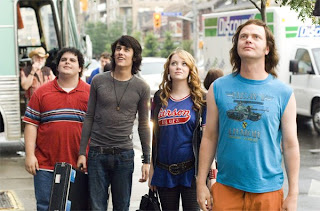What I Learned from Star Trek (TOS) by Alison Bruce
 |
| 2016 is the 50th Anniversary of Star Trek |
If you know me just a little, or you've read A Bodyguard to Remember, you'll know that I'm a Star Trek fan. I wasn't old enough to watch the show when it was originally aired, but it has been part of my life since rushing home from school to watch back-to-back episodes of the show with my mother.
Star Trek, the original series, only lasted 79 episodes, not quite three seasons. Though the ratings were good, it suffered from budget overruns and chronic battles between the producers and the network. I didn't learn about the issues until later in life, but I believe they influenced my life.
For instance, Gene Roddenberry insisted that smoking was a thing of the past, not the future. This was a big deal at a time when tobacco companies were one of the biggest advertisers in television. Both of my parents smoked but neither my sister nor I did. I think it might have been harder to buck the trend if my heroes were smokers.
Kirk: There's only one kind of woman...
Harry Mudd: Or man, for that matter.
Kirk: You either believe in yourself or you don't.
Mudd's Women
 The first interracial kiss on TV was in the episode Plato's Stepchildren. As a kid, it didn't have that big an impact on me. Why? Because it didn't seem controversial to me. I was more concerned about the Spock being forced to woo Chapel because it clearly distressed both of them. Making Kirk and Uhura kiss was a juvenile prank. What Spock and Chapel were put through was cruel. To me, it made a much better point about abuse of power and sexual assault.
The first interracial kiss on TV was in the episode Plato's Stepchildren. As a kid, it didn't have that big an impact on me. Why? Because it didn't seem controversial to me. I was more concerned about the Spock being forced to woo Chapel because it clearly distressed both of them. Making Kirk and Uhura kiss was a juvenile prank. What Spock and Chapel were put through was cruel. To me, it made a much better point about abuse of power and sexual assault.Would the original series have lasted longer? Maybe. Would it continue to be a cultural icon fifty years later? I doubt it.
Kirk's almost weekly love affair with exotic, scantily clad aliens posed a problem for me. It was one of the reasons I could never have a crush on the character. I also questioned why the male officers wore practical pants and tunics while the female officers wore mini dresses. Later, when I saw the pilot episode with Majel Barrett as Number One, I began to understand.
To sell the show, Roddenberry told the networks that Star Trek was essentially "Wagon Train to the Stars." (Which explains Kirk's "cowboy diplomacy.") When Desilu Studios bought the concept, they told Roddenberry to lose the alien (Spock) and the female second in command. Roddenberry held out for Spock, arguing an alien crew member was essential, but he gave in on Number One and practical uniforms for female crew members.
"One of the advantages of being a captain, Doctor, is being able to ask for advice without necessarily having to take it."Being a writer is a little like being captain. You ask for advice... or don't ask but get it anyway. Some of it you take because it really is good advice and it will improve your story. A good editor gives that kind of advice. Some of it you politely ignore. Some advice you have to address whether you want to or not. In those cases you fight for what's important, and give in to the less important.
Kirk, Dagger of the Mind
"Live long and prosper."




Really interesting history on one of my favourite shows, Ali! I had the same problem with Kirk. It was so obviously a male fantasy, his frequent love affairs. And just think of what a wonderful role model it would have been, had there been a female second in command. Instead, we have the Brits to thank for that (the Avengers).
ReplyDelete